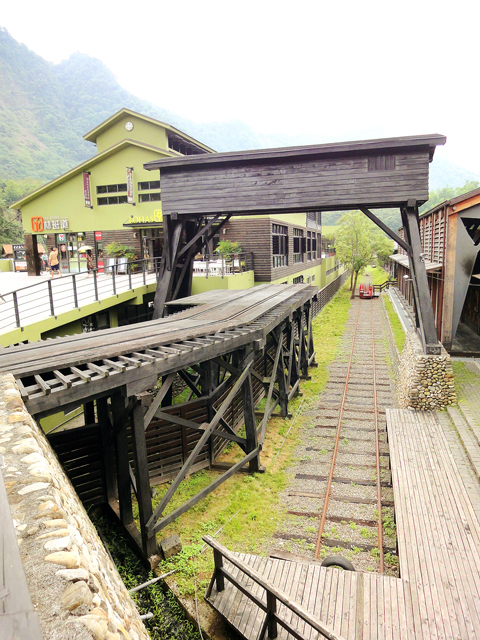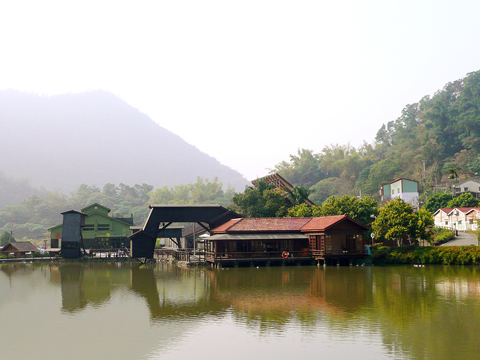Devastated by the 921 Earthquake in 1999, the former logging town of Checheng (車埕), Nantou County, has re-emerged as a must-see scenic spot in the Sun Moon Lake (日月潭) area.
Located on the west side of the lake, Checheng is the terminus of the Taiwan Railway Administration’s (TRA) Jiji Line (集集支線). The name Checheng comes from Tshia-tiann, the word for “parking lot” in Hoklo (also known as Taiwanese).

PHOTO COURTESY OF THE GROVE
During the Japanese colonial era, people would use the carts to travel between the station and the sugar plant in Puli (埔里). When not in use, the carts were parked on light rail tracks nearby.

PHOTO COURTESY OF THE GROVE
Over time, the town’s name became Checheng. Railway Culture Society executive supervisor Cheng Ming-chang (鄭銘彰) said the rise of Checheng in the colonial era was closely related to the construction of the Daguan Water Power Station (大觀電廠).
“Back then, the Jiji Line was owned and used exclusively by Taiwan Power Co,” Cheng said. “The line was used to transport construction materials needed to build the power station.”
After World War II, the logging industry also contributed to Checheng’s prosperity. Founded in 1958 by Taiwanese entrepreneur Sun Hai (孫海), Cheng Chang Corp became the town’s largest timber company between the 1960s and 1980s.
“The company won the timber rights for Danda Forest [丹大林場] in 1959,” said Sun’s granddaughter, Lucille Sun (孫嘉璐). “At one point, the company had about 3,000 employees nationwide and nearly all the residents in Checheng were employed by Cheng Chang.”
Back then, people used to call the areas surrounding Checheng and another town Shueili (水里) “Little Taipei.”
The government took back Cheng Chang’s timber rights for Danda Forest in 1985 and the company branched out into the timber import business.
A majority of Checheng’s residents moved out of the town after Cheng Chang closed its factory. For a long time, the town served as nothing more than a terminal station on the Jiji Line.
Then the 921 Earthquake struck, causing serious damage in Checheng — including the collapse of the train station.
In the aftermath, the Nantou County Government decided to turn administrative authority over Sun Moon Lake over to the central government. The Sun Moon Lake National Scenic Administration was established in 2000 with the purpose of rebuilding the scenic spot.
“We were very lucky,” Lucille Sun said. “The administration had a plan to simultaneously rebuild the scenic spots surrounding Sun Moon Lake and Checheng was one of them.”
Instead of tearing down the facilities at the timber factory, the administration renovated some and turned the damaged timber factory into a tourist attraction.
Tourists can now walk on the wood-paved trail surrounding the lake that was previously used to immerse timber.
The timber factory, now the Checheng Wood Museum (車埕木業展示館), was rebuilt using architecture that tactfully combined wood and steel. To better present the town’s logging history, a setting of how logs were processed was also recreated at the front of the museum.
Meanwhile, the administration kept the overhead cranes in the factory and some of the factory’s tool carts so visitors could get a sense of how it felt to be in the timber town in its early years.
Continuing the family business, Lucille Sun has created a business called The Grove (林班道), which runs a woodcraft factory and a teahouse on the family property.
After visiting the Wood Museum, visitors can go to the woodcraft factory to give a shot at making a small wooden stool or foldable chair.
At the teahouse, they can buy a chicken drumstick with rice in a wooden barrel, which they can also take home as a souvenir after finishing the meal.
The TRA has also reconstructed the Checheng Railway Station and made it a popular stop for tourists.
Sun Moon Lake National Scenic Administration director Tseng Kuo-chi (曾國基) said the launch of National Freeway No. 6 had helped increase tourism to the lake area.
While the administration has built a Sun Moon Lake Ropeway to ease traffic congestion, Tseng said it was planning to build a second ropeway connecting Checheng and the lake.
Checheng now receives about 600,000 people annually, Tseng said. That number could reach 1 million once the second ropeway begins operations.
Based on the administration’s preliminary design, the second ropeway would be about 4.7km long and the system would come with 103 cable cars.
Tseng said the second ropeway was scheduled to be in service in 2016, with construction estimated to cost in excess of NT$2 billion (US$62.4 million).

Chinese spouse and influencer Guan Guan’s (關關) residency permit has been revoked for repeatedly posting pro-China videos that threaten national security, the National Immigration Agency confirmed today. Guan Guan has said many controversial statements in her videos posted to Douyin (抖音), including “the red flag will soon be painted all over Taiwan” and “Taiwan is an inseparable part of China,” and expressing hope for expedited reunification. The agency last year received multiple reports alleging that Guan Guan had advocated for armed reunification. After verifying the reports, the agency last month issued a notice requiring her to appear and explain her actions. Guan

GIVE AND TAKE: Blood demand continues to rise each year, while fewer young donors are available due to the nation’s falling birthrate, a doctor said Blood donors can redeem points earned from donations to obtain limited edition Formosan black bear travel mugs, the Kaohsiung Blood Center said yesterday, as it announced a goal of stocking 20,000 units of blood prior to the Lunar New Year. The last month of the lunar year is National Blood Donation Month, when local centers seek to stockpile blood for use during the Lunar New Year holiday. The blood demand in southern Taiwan — including Tainan and Kaohsiung, as well as Chiayi, Pingtung, Penghu and Taitung counties — is about 2,000 units per day, the center said. The donation campaign aims to boost

The Kaohsiung Tourism Bureau audited six hotels in an effort to prevent price gouging ahead of Korean band BTS’ concert tour in the city scheduled for Nov. 19, 21 and 22 this year. The bureau on Friday said that the audits — conducted in response to allegations of unfair pricing posted on social media — found no wrongdoing. These establishments included the local branches of Chateau de Chine, Hotel Nikko, My Humble House, and Grand Hai Lai, it said, adding that the Consumer Protection Commission would have penalized price gougers had the accusations been substantiated. The bureau said the Tourism Development Act

The Central Weather Administration (CWA) said a magnitude 4.9 earthquake that struck off the coast of eastern Taiwan yesterday was an independent event and part of a stress-adjustment process. The earthquake occurred at 4:47pm, with its epicenter at sea about 45.4km south of Yilan County Hall at a depth of 5.9km, the CWA said. The quake's intensity, which gauges the actual effects of a temblor, was highest in several townships in Yilan and neighboring Hualien County, where it measured 4 on Taiwan's seven-tier intensity scale, the CWA said. Lin Po-yu (林柏佑), a division chief at the CWA's Seismological Center, told a news conference